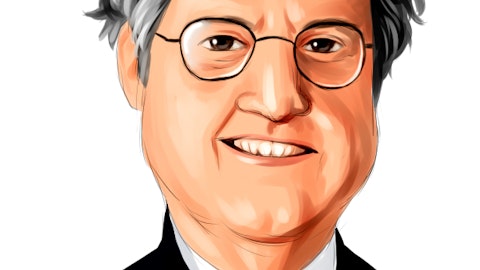Wedgewood Partners, an investment firm based in St. Louis, Missouri, recently published its Q2 investor letter. The firm discussed Berkshire Hathaway (NYSE:BRK.A) (NYSE:BRK.B) and other companies in the letter. We’re focusing on Berkshire in this article. Wedgewood believes that the Berkshire “maintains a long-term competitive advantage in a below-average cost of capital insurance float, which should become more valuable in an environment of both heightened equity market volatility and/or higher cost of borrowing.” Let’s take a look at what Wedgewood said about the Berkshire in the letter.
Berkshire Hathaway was a detractor from performance during the quarter. We chalk up the stock’s pullback as nothing more than a much-deserved rest from the stocks significant outperformance since the end of 2015 versus the benchmark and the S&P 500 Index.
In spite of underperforming the market, the Company reported +18% growth in book value per share compared to last year and has compounded book value per share growth by about +13% during the past three years, which is well above our double-digit growth expectations.
More in line with some of the fastest growing large cap companies, Berkshire continues to plow back close to 100% of its capital into the business. Of course, close to $100 billion of the Company’s capital is tied up in cash or very short-term duration U.S. Treasuries. We think that this “dry powder” bodes well for the future growth profile of Berkshire Hathaway, particularly as the cost of capital rises across the globe – a byproduct of central banks halting and reversing a decade of QE. We believe the Company maintains a long-term competitive advantage in a below-average cost of capital insurance float, which should become more valuable in an environment of both heightened equity market volatility and/or higher cost of borrowing. We expect the cost of capital for Berkshire Hathaway targets to rise faster than Berkshire’s cost of capital, creating a more attractive spread for shareholders.
The growth profile of the Company continues to be underappreciated, but we are content to hold as management and the board have long stuck with a unique share buyback program that we think helps drive the stock to appreciate at least in-line with the attractive aforementioned book value growth. Specifically, the Company will look to buy back shares if the price to book value of the stock falls below 1.2X – which, at this level of margin of safety, would be both immediately and significantly accretive to earnings per share growth. The current valuation is an attractive 1.35X book. The Company has spent very little on buybacks over the past three years, despite a +45% increase in book value, so the market continues to reward the stock without much need for repurchase intervention.
It is impossible to know if the stock would have performed better or worse had the buyback authorization not been in place; however, we consider the telegraphing of this valuation target (combined with the Company’s large cash balance) to have been an incredibly shareholder-friendly way to execute a repurchase program, and we are surprised that few – if any – cash-rich companies have followed suit. We hope more do.

Krista Kennell/Shutterstock.com
Led by legendary investor and billionaire Warren Buffett, Berkshire Hathaway (NYSE:BRK.A) (NYSE:BRK.B) in engaged in diverse business activities including insurance and reinsurance, utilities and energy, freight rail transportation, finance, manufacturing, retailing and services. The Omaha, Nebraska-based company owns GEICO, Dairy Queen, BNSF Railway, Lubrizol, Fruit of the Loom, Helzberg Diamonds, Long & Foster, FlightSafety International, Pampered Chef, and NetJets. It also stakes in Pilot Flying, Kraft Heinz, American Express, Wells Fargo, Coca-Cola, Bank of America, and Apple. Berkshire has averaged an annual growth in book value of 19.0% to its shareholders since 1965.
On July 17, the board of directors of Berkshire Hathaway approved an amendment to the company’s share repurchase program. The previous share repurchase program provided that the price paid for repurchases would not exceed a 20% premium over the then-current book value of such shares. Under the new amended plan, share repurchases can be made at any time that both Berkshire CEO Warren Buffett and Berkshire Vice Chairman Charlie Munger believe that the repurchase price is below the company’s intrinsic value, conservatively determined. The current policy whereby share repurchases will not be made if they would reduce the value of Berkshire’s consolidated cash, cash equivalents and U.S. Treasury Bills holdings below $20 billion will continue. The company will not initiate any share repurchases under the amended program until it publicly releases its second quarter earnings, currently scheduled after the close of the markets on August 3.
Now, let’s take a look at Berkshire’s stock performance. The BRK.B stock has lost 0.83% of its value over the last three months. However the stock has gained 10.34% over the past 12 months. Meanwhile, the BRK.A stock has dropped 3.93% over the last three months while the stock has jumped 12.04% over the last 12 months.
Berkshire Hathaway (NYSE:BRK.B) is a popular stock among hedge funds tracked by Insider Monkey. As of the end of 2017, there were 78 funds in our database with positions in the company.





